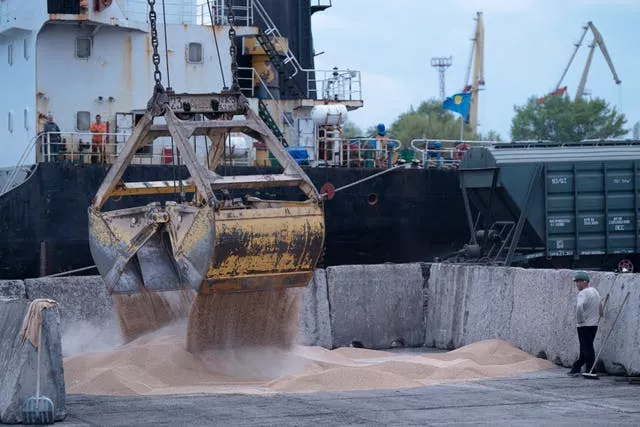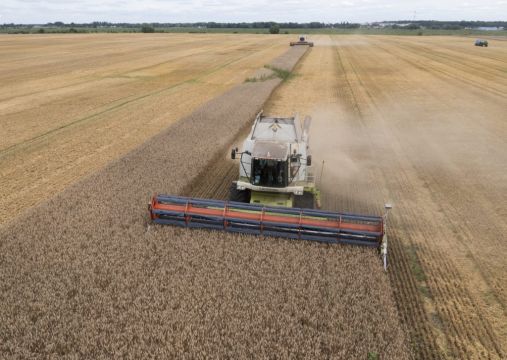Russia has halted an unprecedented wartime deal that allows grain to flow from Ukraine to countries in Africa, the Middle East and Asia where hunger is a growing threat and high food prices have pushed more people into poverty.
Kremlin spokesman Dmitry Peskov announced the deal would be halted in a conference call with reporters, adding that Russia will return to the previous arrangements after its demands are met.
Mr Peskov said: “When the part of the Black Sea deal related to Russia is implemented, Russia will immediately return to the implementation of the deal.”
Russian representatives at the operation centre for the initiative were more definitive, calling the decision “a termination”, according to a note obtained by The Associated Press.
It is the end of a breakthrough accord that the United Nations and Turkey brokered last summer to allow food to leave the Black Sea region after Russia invaded its neighbour nearly a year and a half ago.

A separate agreement facilitated the movement of Russian food and fertiliser amid Western sanctions.
The warring nations are both major global suppliers of wheat, barley, sunflower oil and other affordable food products that developing nations rely on.
Russia has complained that restrictions on shipping and insurance have hampered its exports of food and fertiliser – which is also critical to the global food chain.
But analysts and export data say Russia has been shipping record amounts of wheat, and its fertilisers have also been flowing.
Ukrainian President Volodymyr Zelensky said he wanted to keep the initiative going even without Russia’s safety assurances.
“We are not afraid,” he said. “We were approached by companies that own ships. They said that they are ready, if Ukraine gives it, and Turkey continues to let it through, then everyone is ready to continue supplying grain.”

Turkish President Recep Tayyip Erdogan said the country’s foreign minister would speak with his Russian counterpart on Monday — and that he was hopeful the deal would be extended.
The agreement was renewed for 60 days in May amid Moscow’s pushback. In recent months, the amount of food shipped and the number of vessels departing Ukraine have plunged, with Russia being accused of limiting additional ships which would be able to participate.
The war in Ukraine sent food commodity prices surging to record highs last year and contributed to a global food crisis also tied to conflict, the lingering effects of the Covid-19 pandemic, droughts and other climate factors.
High costs for grain needed for food staples in places like Egypt, Lebanon and Nigeria exacerbated economic challenges and helped push millions more people into poverty or food insecurity.
People in developing countries spend more of their money on meals. Poorer nations that depend on imported food priced in dollars also are spending more as their currencies weaken and they are forced to import more because of climate issues. Places like Somalia, Kenya, Morocco and Tunisia are struggling with drought.
Prices for global food commodities like wheat and vegetable oil have fallen, but food was already expensive before the war in Ukraine and the relief has not trickled down to kitchen tables.
Simon Evenett, professor of international trade and economic development at the University of St Gallen in Switzerland, said: “The Black Sea deal is absolutely critical for the food security of a number of countries,” and its loss would compound the problems for those facing high debt levels and climate fallout.
The #SOFI2023 report estimates that:
🔸around 735 million people suffer from hunger
🔸over 122 million more people have been pushed into hunger since 2019
🔸more than 3.1 billion people in the world cannot afford a healthy diet
Read the full @UN report👉 https://t.co/9MLcci7QLw pic.twitter.com/dAYDpGS31i— Food and Agriculture Organization (@FAO) July 12, 2023
He noted that rising interest rates meant to target inflation as well as weakening currencies “are making it harder for many developing countries to finance purchases in dollars on the global markets”.
While analysts do not expect more than a temporary bump to food commodity prices because places like Russia and Brazil have ratcheted up wheat and corn exports, food insecurity is growing.
The UN Food and Agriculture Organisation said this month that 45 countries need outside food assistance, with high local food prices “a driver of worrying levels of hunger” in those places.
The Black Sea Grain Initiative has allowed three Ukrainian ports to export 32.9 million metric tonnes of grain and other food to the world, more than half of that to developing nations, according to the Joint Coordination Center in Istanbul.
The deal has faced setbacks since it was brokered by the UN and Turkey: Russia pulled out briefly in November before rejoining and extending the deal.
In March and May, Russia would only extend the deal for 60 days, instead of the usual 120. The amount of grain shipped per month fell from a peak of 4.2 million metric tonnes in October to 1.3 million metric tonnes in May, the lowest volume since the deal began.







